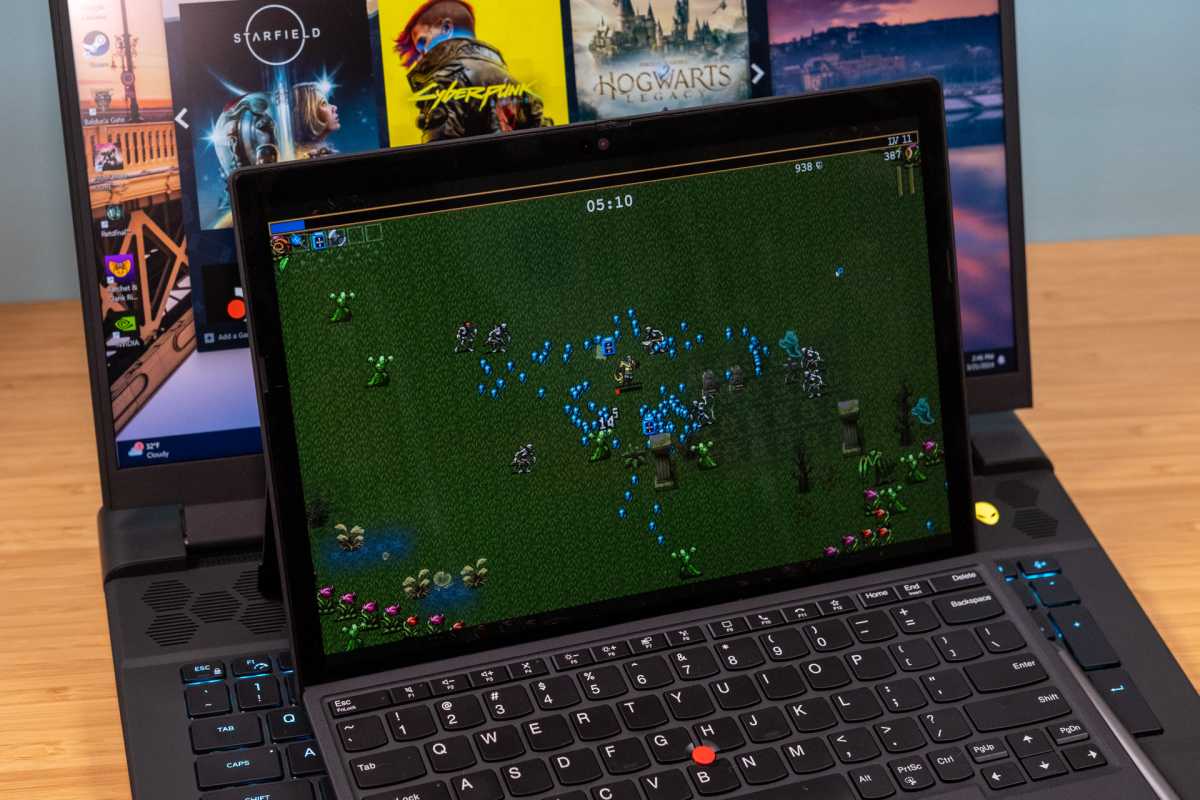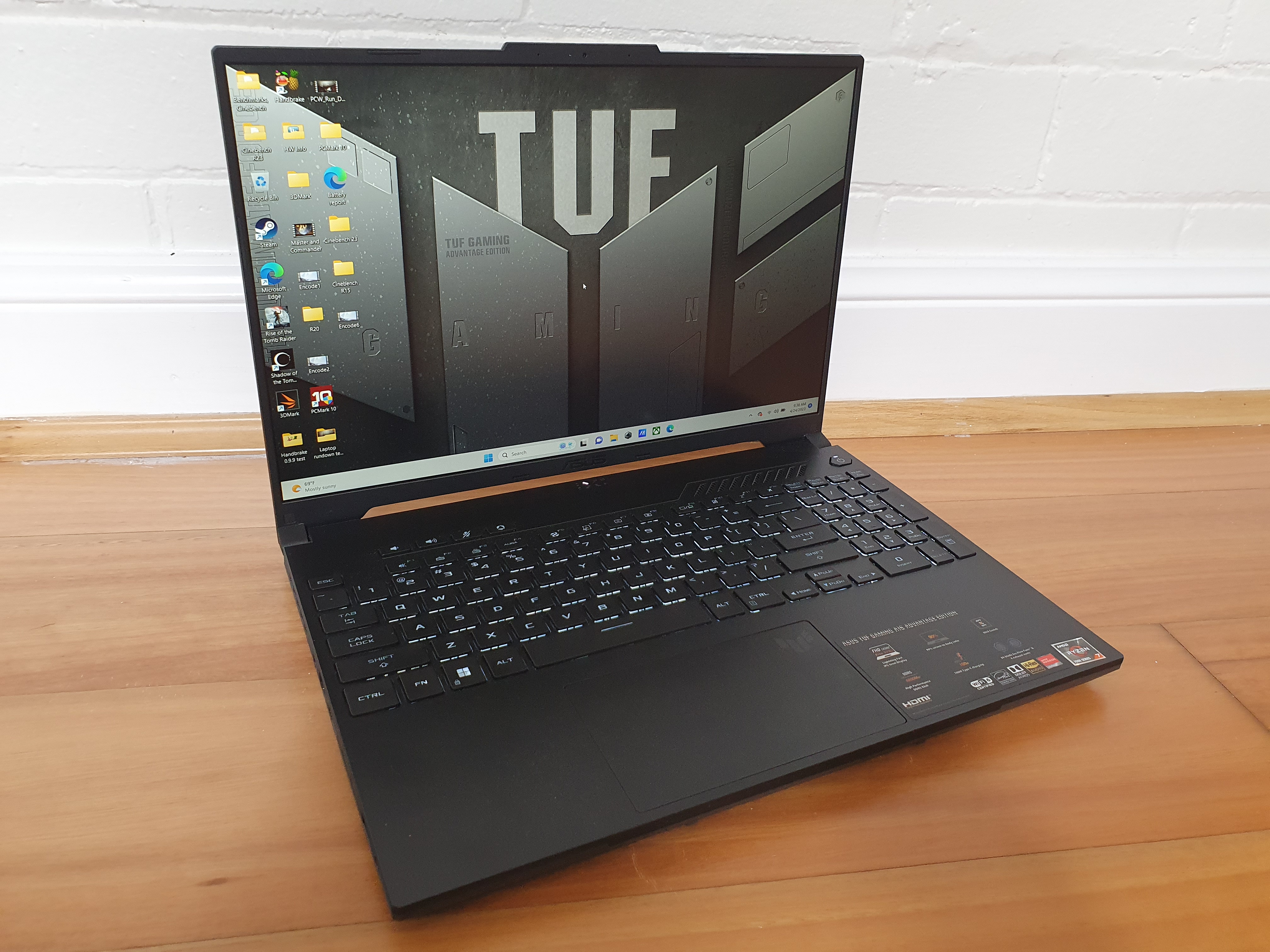
 Image: IDG / Matthew Smith
Image: IDG / Matthew Smith
Laptop hardware has come a long way in recent years, with the most expensive models featuring CPU and GPU specs similar to what you’d expect from a beefy gaming desktop PC. If a laptop isn’t aimed squarely at gamers, odds are it lacks a discrete GPU for gaming.
With an integrated GPU (iGPU), you’ll never get to explore futuristic ray traced cityscapes or the ultra-detailed surface of an alien world, but that doesn’t mean your computer time has to be totally about productivity. If you temper your expectations, you can still get some gaming done with integrated graphics.
Looking to pick up a gaming laptop? Check out PCWorld’s roundup of the best gaming laptops available today.
Keeping it simple
Both Intel and AMD have worked to improve integrated graphics in their chips. Although, gaming is not the intended use case for iGPUs. Even the best integrated graphics are a far cry from what you’d get even any current-generation GPU. These components are powerful enough to drive external displays and render high-resolution video, but trying to run the latest games is bound to be an exercise in frustration.

Ryan Whitwam/IDG
Ryan Whitwam/IDG
Ryan Whitwam/IDG
Your best bet to enjoy games on integrated graphics without the headaches is to focus on simpler indie titles. You can easily run a game like Vampire Survivors, which is remarkably fun despite its low-fi pixel art visuals. You don’t need a fancy GPU for this one—it only requires a GPU that can run DirectX 11 or higher. There’s also the hit side-scroller “Metroidvania” title Dead Cells, which only requires DirectX 9.1 or higher.
Those games are just the tip of the pixelated iceberg. A modern iGPU can also handle games like Stardew Valley, Papers Please, and Hollow Knight without breaking a sweat. There are countless indie games that could run on a toaster but are still worth playing—graphical fidelity isn’t everything.
Pushing the envelope
Moving beyond 2D platformers and roguelikes will push an integrated GPU to its limit, but that doesn’t mean you can’t find something to enjoy. AMD has pushed the envelope with its latest iGPUs, which feature RDNA-based Radeon graphics processors. Intel has its Iris XE graphics built into the latest Core CPU family.
The latest iGPUs from Intel and AMD have more oomph than you might think, though. For example, Ryzen laptop APUs based on the Zen 3 and Zen 4 architectures have 600 and 700-series Radeon GPUs. While they’re still not as powerful as dedicated GPUs, some of these graphical processors are within spitting distance of older entry-level cards like the Nvidia GTX 1650. This five-year-old GPU is still used as a benchmark for budget-minded 1080p gaming setups, and that means you can accomplish similar feats with integrated graphics.
The key to playing newer games on integrated graphics without pulling your hair out is to turn the settings down to the lowest level. You’ll miss out on fancy visuals, but many games can run surprisingly well at 720p or 1080p with an iGPU. Games that push the graphical envelope, like Cyberpunk 2077, will struggle to hit 30 fps, which is probably too stuttery to play. Fast paced games are touch and go as even a few spots of lag can spell disaster. However, even mainstream titles can surprise you with their resilience. Fortnite’s simple, cel-shaded graphics remain consistently above 30 fps with the latest Intel and AMD iGPUs, as long as you lower the settings to minimum. That should be fine as long as you’re not trying to play at a competitive level.
Even if your lowly iGPU can’t keep up with a game, there may be hope thanks to AI. Features like Intel XeSS and AMD FSR can upscale games to a higher resolution for improved visuals. This can be the difference between an unplayable 20-something framerate and solidly above 30 fps. The game needs to have upscaling support, but FSR is particularly common in games released in the past few years, and it works with either AMD or Intel chips.
You might also choose to step back in time to experience the triple-A games of yesteryear. Given enough time, games that required expensive discrete GPUs at launch can run on modest laptop hardware. GTA V came out almost a decade ago, offering an expansive story that takes place in the sprawling, detailed city of San Andreas. The gameplay is still good enough to tide you over until GTA VI launches next year, and it’ll run at almost 60 fps with a good iGPU like the Radeon 780m. Naturally, you’ll have to stick to low settings and resolution.
The future of budget gaming
our favorite gaming laptop under $1000 can play all games
Asus TUF Gaming A16 Advantage Edition

 Read our reviewPrice When Reviewed:$1,099.99Best Prices Today:$949.99 at Best Buy | $955 at Amazon
Read our reviewPrice When Reviewed:$1,099.99Best Prices Today:$949.99 at Best Buy | $955 at Amazon
We may see even brighter days ahead for iGPU gaming. The incredible success of Valve’s Steam Deck has spurred the creation of numerous handheld game machines like the Asus ROG Ally and the MSI Claw. These devices run AMD and Intel processors with integrated GPUs, and owners play games that run the gamut from Vampire Survivors to Baldur’s Gate III, which is the most popular Steam Deck title as of early 2024. Steam Deck owners are also playing a lot of Hogwarts Legacy, Palworld, and GTA V. These games might not run amazingly on iGPUs, but they’re playable.
These newer 3D games won’t look amazing on integrated graphics, but the popularity of Windows gaming handhelds will push more developers to optimize for weaker GPUs. Even Microsoft is talking about streamlining Windows to give integrated graphics more room to succeed.
At the end of the day, the best way to enjoy gaming on a laptop is to buy one with a discrete GPU. That’s not always an option, though. Even modest gaming laptops will cost hundreds of dollars more than a mainstream, productivity-oriented machine. Alternatively, you can upgrade your gaming experience on the cheap by subscribing to a service like GeForce Now or Xbox Cloud Gaming. If your laptop is powerful enough to decode HD video, it can stream games from these services. Nvidia has a free version of GeForce Now with time limits and less powerful cloud hardware, but Xbox Cloud will run you $16.99 per month if you want to play on your Windows laptop
Author: Ryan Whitwam

Ryan Whitwam is a freelance tech writer, a fan of all things electronic, a long-time skeptic and a former research scientist. At PCWorld, he covers computer hardware and software.
Recent stories by Ryan Whitwam:
Alienware m18 R2 review: A gaming juggernaut with speed to spareBest Xbox controller for PC: Hand-picked recommendations for all budgetsBest PC controllers: Recommendations for every gamer


